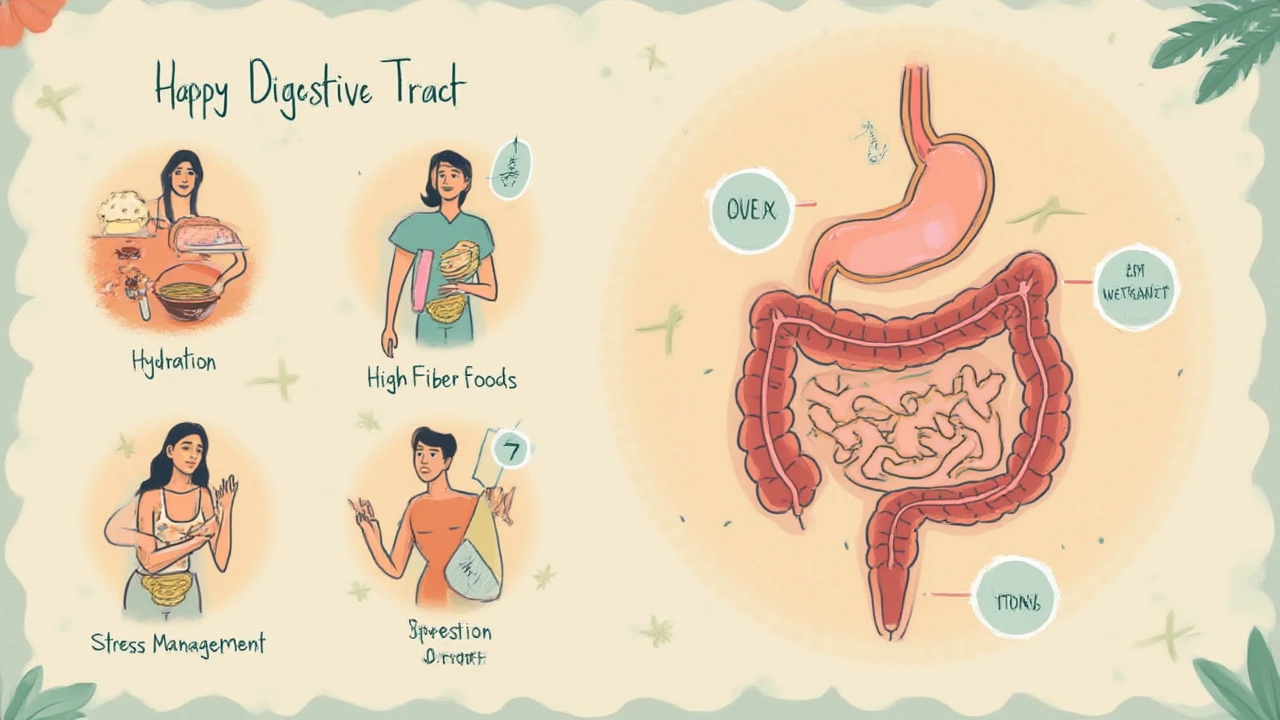Why Does My Poop Come Out in Small Soft Pieces? Causes, Solutions, and What It Means

Ever glanced into the toilet and thought, “Why does my poop look like a bunch of soft pebbles instead of a nice, smooth log?” It sounds funny, but honestly, it messes with your head. Most folks never chat about what goes down in the loo, but here’s the thing—your bathroom habits reveal loads about your health. A sudden change, like passing small soft pieces, often sparks worry. Maybe you’re googling it on your phone while pretending to read the news. Or maybe you’re quietly panicking and thinking it’s something serious. Truth is, there’s usually a pretty clear reason your gut has switched things up. Let’s get real about the weird, the normal, and the warning signs—plus, what you can do about it without getting lost in medical mumbo-jumbo.
Understanding What 'Normal' Poop Looks Like
Believe it or not, there’s actually a gold standard for poop. The Bristol Stool Chart—a real, official thing first used in hospitals in 1997—sorts your stools into seven types, from little hard rabbit droppings (Type 1) all the way to watery, no-solid-pieces chaos (Type 7). Type 4 is what most doctors want to see: smooth, sausage-like, and easy to pass. If your poop’s coming out in small soft pieces, you’re somewhere between Type 5 (soft blobs with clear edges) and Type 6 (fluffy pieces with ragged edges). That means it’s not exactly diarrhea, but it isn’t firm either.
Why does this matter? Different shapes and textures tell us how long things spent in your digestive tract. A normal bowel habit usually means your gut is healthy and moving at just the right speed. If things suddenly turn into soft blobs, your body’s telling you something’s off—maybe you’re stressed, ate something odd, or your gut needs a bit of TLC. Around 1 in 4 Brits have occasional changes to their stool, so you’re far from alone here. Still, if your toilet paper is shockingly clean because your stool just falls apart, it’s time to dig into what causes these soft chunks.
Common Causes for Small Soft Poop Pieces
There’s no single culprit behind soft, broken-up stool, but a few usual suspects keep cropping up.
- Diet swap or binge: Packing your plate suddenly with fiber-rich foods (think beans, wholegrain breads, or too many prunes) can change stool consistency. Your gut loves consistency; sudden changes, not so much.
- Hydration slip-ups: Not drinking enough water makes your colon work harder, sucking more water from waste, sometimes leading to a lumpy texture. Oddly enough, being too hydrated—like knocking back electrolytes all day—can soften it too much.
- Food intolerances: Maybe you’ve unknowingly eaten something that triggers your gut—a classic is lactose intolerance. Even one sneaky ingredient can throw everything off.
- Stress or anxiety: Ever felt that nervous rush before something big? Your gut feels it too. Stress can speed things up, giving your stool less time to form a neat log.
- Medications: Some antibiotics, antacids, or even common painkillers like ibuprofen can mess with gut bacteria, making stools softer than you’d expect.
Of course, there are less usual medical reasons, too. Conditions like irritable bowel syndrome (IBS) often cause constantly changing stool—sometimes hard, sometimes soft, always unpredictable. If you’re seeing a pattern or if symptoms show up alongside bloating, cramps, or mucus, keep that in mind when talking to your doctor.

What You Eat (And Drink) Really Matters
It’s tempting to blame your gut on bad luck. But nine times out of ten, diet plays the biggest role in how your poop looks. If your breakfast was a dodgy sandwich from the petrol station or you’ve slammed three coffees without any water, your gut is just reacting to what you put in it. The ideal routine? A mix of soluble fiber (like oats, apples, and beans), the right amount of insoluble fiber (wholegrain bread or carrots), and enough fluids—especially plain water or herbal tea.
Check this out—recent NHS data shows the average UK adult only eats about 18g of fiber a day, not the recommended 30g. Fall too low, and you risk hard, lumpy stools. Swing too high too quickly, and your body rushes waste through, breaking it apart and making it soft or even runny. Balance matters. A lack of fiber also leaves your gut bacteria—those little invisible helpers—hungry, and that can mess with consistency. If things turn soft for a few days, ask yourself: did you eat a weird takeaway, skip meals, or go hard on fresh fruit? Sometimes it’s that simple.
| Factor | Change in Stool | How to Fix |
|---|---|---|
| High fat/greasy meal | Softer, looser stools | Add fibre, cut processed fats |
| Sudden fiber increase | Small, broken pieces | Raise fibre slowly |
| Low fluid intake | Dry, lumpy pieces | Increase water intake |
Want a gut-friendly tip? Try eating a handful of nuts daily, swap white bread for seeded wholegrain, and go easy on fizzy drinks. And if you love making changes, do them bit by bit. Nobody’s gut likes a shock.
When Should You Worry? Spotting Red Flags
Most of the time, small soft poop is just your gut having a strange day or two. But there are signs you shouldn’t ignore. Start paying attention if you spot blood, especially bright red or black streaks. If you see mucus often (that jelly-like stuff), notice sudden weight loss without trying, start feeling fevers, or deal with poo trouble for weeks, it could point to something bigger—like infections, inflammation, or even (rarely!) bowel cancer. About 1 in 2 people with IBS have broken-up stool, but they also notice cramping, urgency, or gas.
The real trick? Know your ‘normal’ so you can spot when something’s off. Everyone’s got a different poop routine, and that’s alright. If you’re getting up at night with diarrhea, or you’re losing control, see a doctor. No shame in it! Also, if you’re over fifty and you spot any changes lasting more than three weeks, get checked. The NHS even mails out bowel cancer screening kits once you hit age 60. They’re not fun, but they save lives every year.
- Blood in stool or toilet bowl
- Unexplained pain or discomfort
- Sudden changes for more than two weeks
- Unexpected weight loss
- Fever or chills along with changes
- History of bowel diseases in the family
Don’t panic—chances are it’s nothing serious. But when in doubt, check it out. Doctors see this stuff all the time.

Simple Tips to Get Back to Normal
If small soft poop has become your new normal, give your gut a little help. Aim for steady, gentle changes, not dramatic overhauls.
- Monitor your fiber: Track what you eat. Try to hit at least 25-30g a day. Use apps or scribble in a journal—whatever works.
- Keep hydrated: Two litres of water daily (about eight cups) helps most people, but up it if you sweat a lot or it’s hot out.
- Balance your gut bugs: Yogurt with live cultures, kefir, or even a probiotic supplement can reset things if you’ve been on antibiotics or had a rough week.
- Stay active: Even a half-hour walk wakes up your bowels and encourages a ‘normal’ pattern.
- Chill out: Easy to say, hard to do—stress is a massive trigger for gut changes. Try deep breathing, music, or a bit of daily mindfulness.
Some folks swear by keeping a ‘poop diary’ for a couple of weeks. It shows patterns you might not spot otherwise. And by the way—don’t get obsessed with aiming for perfect stool every day. Your gut bounces around based on a thousand tiny things, from the weather to what you had for dinner. Spot trends, not one-offs. If in doubt, you’ll find your GP more than happy to talk toilet—they’ve heard it all before.
Keep an eye on your own ‘normal,’ trust your gut (literally), and make tiny shifts to see what helps. Your body’s good at telling you what it needs—you just need to listen once in a while. Next time your poop breaks into pieces, you’ll know exactly why and what you can do about it.